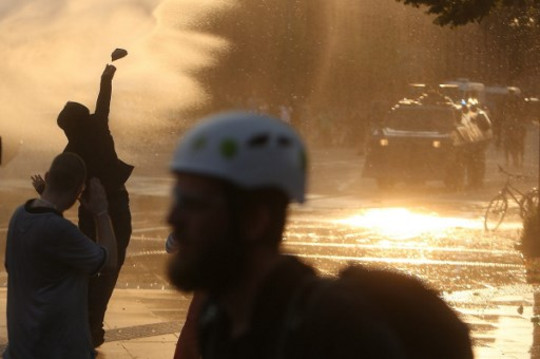<font size="3"><font face="Calibri">At least 32 journalists have been deprived of their press accreditations by the German government during the G20 protests in Hamburg held on 7 July. The International and European Federation of Journalists (IFJ-EFJ) join their German affiliates DJU and Ver.di (DJV) in condemning the attacks against the press. </font></font>
<font size="3"><font face="Calibri">Nine journalists have had their accreditations revoked with an additional 23 placed on a list detailing them as a security concern. Those listed were not present at the G20 Press Center, according to IFJ/EFJ affiliates. </font></font>
<font size="3"><font face="Calibri">Government spokesperson Steffan Seibert confirmed the removal of the accreditations but didn’t provide any justification for it. </font></font>
<font face="Calibri"><font size="3">Media outlet Weser Kurier</font><font size="3"> has filed an objection to the Federal Press Office after their photographer Rafael Heygster had his accreditation revoked. DJU member Born Kietzmann has also spoken out against the removal of his accreditation. </font></font>
<font size="3"><font face="Calibri">According to German unions’ reports a number of journalists were subjected to verbal and physical abuse from German riot police including threats, beatings and pepper sprayings despite journalists being clearly identifiable.</font></font>
<font size="3"><font face="Calibri">The DJV and the German Journalists’ Union (DJU) lodged complaints to the Federal Criminal Police Office (BKA). </font></font>
<font size="3"><font face="Calibri">“The way BKA dealt with accreditations is legally highly questionable,” said Cornelia Hass, chairwoman of the German Journalists’ Union (DJU). Several members have contacted the DJU since Friday, due to their accreditations being withdrawn. </font></font>
<font face="Calibri"><font size="3">Reporters of German newspapers Taz</font><font size="3">, </font><font size="3">Junge Welt</font><font size="3">, </font><font size="3">Weser Kurier</font><font size="3"> and </font><font size="3">Analyse&Kritik</font><font size="3"> were stripped of their papers, with the identical justification of “safety-related findings”. </font></font>
<font face="Calibri"><font size="3">“One cannot help but think this happened for the reason to prevent disagreeable media coverage,</font><font size="3">” says Hass. “</font><font size="3">This procedure defies our democratic principles, therefore we filed an objection with the authorities</font><font size="3">.” </font></font>
<font face="Calibri"><font size="3">DJV has called the decision to withdraw press accreditations “entirely arbitrary</font><font size="3">". DJV chair Frank Überall has requested the Federal Office of Investigation (BKA) to not impose any further restrictions on journalists. In a letter addressed today to the BKA, DJV President Holger Münch asked the Office to justify their approach against journalists.</font></font>
For more information, please contact IFJ on + 32 2 235 22 16
The IFJ represents more than 600,000 journalists in 141 countries

